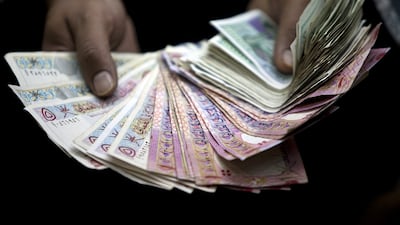Gulf countries have traditionally rejected personal income tax for a variety of reasons. This year, circumstances have changed, transforming such a tax into a viable option. A key supporting factor is the political dysfunction afflicting many western countries, as it has changed the public rhetoric surrounding the role of taxation in modern societies.
Before the discovery of oil, nomadic and semi-nomadic life was the norm in much of the Gulf, ruling out the possibility of the sort of powerful central bureaucracies commonly seen in Europe. Taxation was very limited, and government scope was typically restricted to internal security and external defence.
Following the establishment of modern states and the discovery of oil, Gulf governments acquired revenue that allowed them to expand their activities to include basic services such as education, health and social security. However, unlike Europe, this was achieved without levying taxes due to the abundance of hydrocarbon income.
By the middle of the 2010s, two developments rendered the previous configuration untenable for certain Gulf countries. The first was population growth outstripping the rate at which oil revenue was increasing, leading to a decrease in per capita oil revenue. The second was a decrease in the long-term price of oil, especially following the 2014-2016 crash. As their budgetary demands increased, some Gulf governments were forced to review spending and increase taxation.
Nobody enjoys seeing their tax burden increase. This means that the communications strategy a government pursues when it levies taxes is critical to the tax’s long-term success. The key is convincing the public that the prevailing setup is unsustainable, and that the alternatives to increasing taxes are considerably worse.
Equally important is the public discourse regarding the purpose that taxes serve. In some historic civilisations, most notably that in England, there are very specific legal and social norms relating to the process of levying taxes dating back to the 13th century, and these continue to inform the views of ordinary people 800 years later, reinforced by the educational curriculums that all school children learn. In the Gulf, while not exactly a tabula rasa, there is much more scope for the government to shape people’s expectations surrounding taxation.
The first step taken was the imposition of value-added tax (VAT) in the late 2010s. This was chosen among a wide range of options, including income tax, corporation tax, inheritance tax, property tax, and so on. While many factors contributed to this choice, two are particularly noteworthy. The first is its nominal similarity to the only long-standing tax paid by people in the Gulf – customs tax. This made it easier to present it as a natural extension of the current system.
The second is that it is what economists call an indirect tax, meaning that it is imposed on goods and services, in contrast to direct ones such as income tax, which are levied on individuals and organisations. At the psychological level, this makes it more palatable to the individual, since it has a lustre of being legally avoidable for the canny consumer. Direct taxes are much more personal in composition, inducing an often more visceral sense of distaste from the person being taxed, as famously occurred when former UK prime minister Margaret Thatcher tried to levy a poll tax during the 1980s.
VAT has made a positive contribution to the sustainability of public finances in Bahrain, Saudi Arabia and the UAE. In Oman, as the population continues to grow and the oil price outlook continues to appear uncertain, fiscal technocrats are considering the imposition of an income tax.
Beyond its capacity to generate robust revenues for the government, income tax has an additional virtue over VAT: it is easier to make it progressive, meaning that people with higher means pay a disproportionately higher share. In countries such as the US, income taxes are effectively negative for those with the lowest income as they pay no taxes and receive income support, rising to about plus-10 per cent for those with low income, and then becoming acutely positive for society’s biggest earners. Societal resistance to progressive taxes is much lower than for neutral or regressive ones, as the burden on the rich is much higher.

An external development has further enhanced the attractiveness of income tax to some Gulf societies. In the past, western countries that had income taxes also had the best infrastructure, education, health and militaries in the world. This created a mental association between levying the tax and the socio-political system commonly seen in the West. However, a combination of economic and political decay that has been under way in the West has severed this link.
As an illustration, when Gulf tourists used to travel to western countries in the 1980s, they would marvel at the cleanliness of the streets, the quality of public transport, the efficiency of the hospitals, and so on. Moreover, they would feel safe walking in the street. However, in 2024, many of these virtues are absent, and people from our region feel genuinely insecure when visiting, while reading about horrible violent crimes through the media with increasing regularity.
Accordingly, when a government official in the Gulf touts the idea of imposing an income tax and justifies it by pointing to the good-quality public services that residents enjoy under the Gulf’s socio-political system, the argument is more convincing than ever.
People in the region highly value state services such as putting violent criminals behind bars and educational curriculums that are not overly responsive to the demands of politically active groups. While nobody wants to pay income tax, Gulf citizens are acutely aware that they are lucky compared even to those in some of the richest countries in the world, and so their tolerance of such levies is probably at an all-time high. Therefore, while income tax is by no means a foregone conclusion, don’t bet against it, either.









